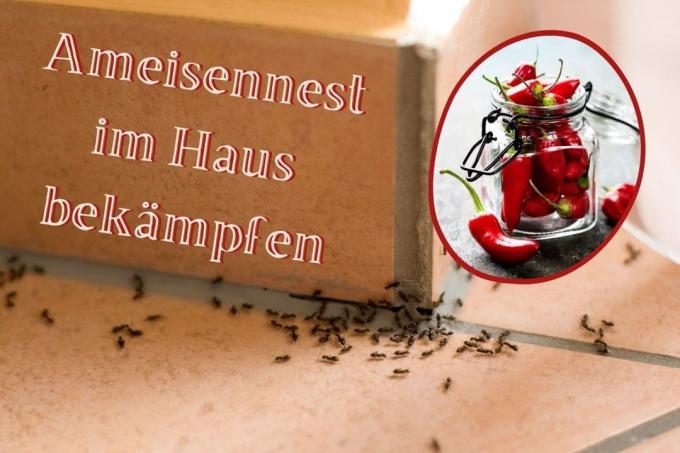
table of contents
- Recognize the ant nest
- Unsuitable methods
- Remove nest
- Repellants
- Glue traps
- Funds from the trade
- Prevent
- Take special care in the kitchen
- frequently asked Questions
Ants can quickly become a nuisance if they are clustered or in the home. It is especially bad if it is an ant nest in your house. How it disappears is in this article.
In a nutshell
- Ant nests in the house are rare
- but they are more difficult to find and to combat
- substances that are safe for humans and pets should only be used
- Prevention is important and necessary
Recognize the ant nest
An ant in the house does not mean that there is a whole ant nest in it. However, if there are several animals or even an ant trail, caution is advised. Follow the animals or the road to find out where they're going or where they're coming from. At the end there is usually the source of food, at the beginning the nest or the access to the apartment.
A nest in the house is often difficult to see because it is not built from earth like in the garden. The following tips can help:

- Check the soil of potted plants and overwintering potted plants
- Inspect cavities in the brickwork, ceiling or floor
- particularly suspicious: many insects in one place or several ant trails converge
Unsuitable methods
Many recommendations for fighting ant nests are difficult or impossible to carry out indoors. Boiling water should be very effective, but it can hardly be used in the rented apartment. It is similar with traps that are supplemented with attractants such as sugar water. Although it can be used to catch individual animals, it does not get rid of the nest.
Other home remedies such as baking powder, baking soda or deer horn salt are effective, but also cruel for the animals. They eat the substances that float up in their stomachs and literally make them burst.
Remove nest
The easiest way to get rid of an ant nest is when it is easily accessible. Depending on where the insects have settled, the nest can be removed with a dustpan. The vacuum cleaner reliably vacuums individual ants.
If the nest is inaccessible from the outside, only means of evacuation will help.
Repellants
Strongly smelling herbs or spices that are applied around the ant nest in your house are primarily suitable. Since they have to work for a long time, it is best to choose something that you can smell yourself well. These herbs, spices or parts of plants are suitable:

- lavender
- mint
- thyme
- Cloves
- laurel
- chili
- cinammon
- Lemon peel
- Fern fronds
Note: Herbs can be used fresh, dried, or as an oil.
Vinegar is also disruptive to the insects' sense of smell. Wipe all corners that are frequently visited by the animals with vinegar. The same goes for the ant trails. You can also add vinegar to the mopping water and use it to clean the entire apartment.
Glue traps
All ant species are only out on foot, the wedding flight is the only exception. Adhesive strips on much-frequented paths or on windows and doors therefore successfully stop the animals. There is Glue traps to buy, but double-sided tape is also sufficient. Yellow panels, on the other hand, are useless because the animals do not orient themselves to colors.

Funds from the trade
Any remedies from specialist retailers aim to kill the insects. Sometimes more, sometimes less effective. Bait cans attract the animals, which carry the poison they contain into their ant nest in the house. Ultimately, all animals in it should gradually die. However, this can drag on over a longer period of time.
Bug spray mainly kills ants walking around looking for food, if there is a nest it is not very effective. Caution should be exercised with all of these insecticides as they must be kept away from other residents of the house.
Prevent
- Close windows and doors with insect screens
- Check the insect screen regularly for damage
- Pay particular attention to tight fastening
- Close holes in and outside the house close to the ground
- especially check the basement
Take special care in the kitchen
- The kitchen and pantry are often infested with insects
- Always store food tightly closed in a cool and dry place
- Refrigerator seal is not always an obstacle
- native species of ants withstand low temperatures without any problems
- Thoroughly clean surfaces after preparing food
- remove all food residues
- Clean used dishes promptly

Note: Do not store rubbish for compost or the organic waste bin in the apartment, as this attracts insects in particular!
frequently asked Questions
Where exactly the animals build their nest depends on the prevailing environmental conditions and the type of ant. That it is a house at the moment is mostly a coincidence. Because they have found a loophole and a place that is well suited for nest building.
That is rather difficult, even if there are appropriate recommendations. Since there are usually hidden nests in the house that are not easily accessible, the ants do not leave it without necessity. Above all, it is difficult to get hold of the queen.
The native species of ants are mostly harmless to houses and furnishings. At most, they damage plants and, of course, supplies. Care should be taken with the wooden ant, which builds its nest in rotten wood.
Whenever the ant problem develops into a real nuisance and the nest is difficult to access, for example because it is in the brickwork or in a wooden beam.

